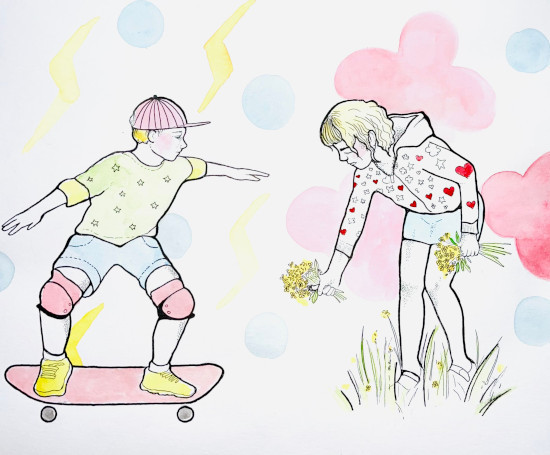What lies beyond the perimeter
Contesting the urban-rural divide on safety

Illustration by Gabrielle Funk
Winnipeg is a crime-infested cesspool, where danger lurks around every corner – especially downtown.
Well, not really, but this is what I hear from people in my community on the eastern outskirts of the Perimeter Highway. While this is purely anecdotal, I’d be hard-pressed to think of anyone I know out here – who hasn’t lived in Winnipeg in the past – who doesn’t believe the city is a lawless hellscape.
I have always found this to be, frankly, quite funny. After nearly a decade of living in the country, I still bristle at comments about “city people” and how dangerous Winnipeg is.
My RM is comically over-policed. In addition to an RCMP dispatch in the area, there is also a separate Springfield Police force, for some reason. There’s even a Citizens on Patrol Program (COPP) that consists mostly of retired white men snitching on teenagers driving around at night.
This is quite different from the world I remember as a kid.
I grew up in the South Osborne area of Winnipeg in the ’80s and ’90s and left the area in 2015, shortly before I turned 31. I not only left South Osborne, along with my wife and our newborn son, but I left Winnipeg altogether. We moved to a five-acre plot just east of the city in the RM of Springfield where my wife grew up.
I enjoyed a childhood that my children, Lewis (9) and Margaret (4), could never dream of. Living in an urban area, I could walk and ride my bike to school or my friends’ houses. If I wanted a treat, the Mac’s convenience store on Osborne was always open, and I could easily go there with a little bit of change in my pocket and get whatever I wanted.
As a tween, I’d hop on the 16 Osborne bus downtown to purchase records and CDs from the Music Baron on Portage Avenue without stopping to think about how safe or unsafe I would be. Granted, some of this obliviousness to danger stemmed from my being a white, middle-class male, which is something I wouldn’t have even considered in 1996.
Where I live now, I don’t think we’ve ever locked our front door. The only crime I’ve been impacted by was when my neighbours were out of town and some people stole two broken power tools from their garage at 2 a.m.
My children live about five miles from the nearest school and convenience stores. They can’t go anywhere without needing a ride. As such, I worry that they aren’t going to learn the proper skills to keep themselves safe once they can drive and get away from their parents.
This may make them “safer” than I was, but it’s a short-term, short-sighted solution.
My children have never interacted with unhoused people. They don’t see institutional racism in front of them. They have limited exposure to extreme poverty.
I want them to be “safe,” but I also want them to develop compassion and love for people who haven’t had the same advantages and privileges.
It’s difficult to teach kids about these issues from a distance.
It’s especially difficult if the prevailing narrative they hear from their friends and grownups in the community is that Winnipeg is dangerous, and you should avoid it at all costs.
Paul Hodgert is the business manager for The Uniter and still thinks of himself as a “city boy” after nearly a decade in the country.
Published in Volume 78, Number 24 of The Uniter (April 4, 2024)







